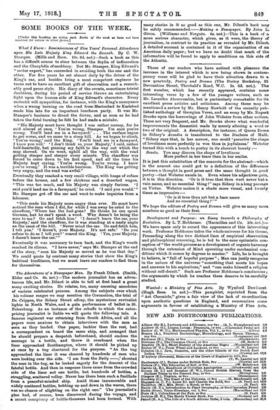Those of our readers who have noticed with pleasure the
increase in the interest which is now being shown in contem- porary verse will be glad to have their attention drawn to a new quarterly, Poetry and Drama (The Poetry Bookshop, 35 Devonshire Street, Theobald's Road, W.C. 2s. 6d. net.). The first number, which has recently appeared, contains some interesting verse by a few of the younger writers, such as Mr. Lascelles Abercrombie, but is particularly remarkable for its excellent prose articles and criticisms. Among these may be mentioned a review by Mr. Henry Newbolt of the recently pub- lished anthology of Georgian Verse, and an essay by Mr. Rupert Brooke upon the borrowings of John Webster from other writers. These are very frequent, and Mr. Brooke shows what wonderful, improvements the dramatist made by merely altering a word or two of the original. A description, for instance, of Queen Erona in Sidney's Arcadia is transferred to the Duchess of Malfi. "Sidney says that, in her sorrow, one could 'perceive the shape of loveliness more perfectly in woe than in joyfulness.' Webster turned this with a touch to poetry in its sheerest beauty :— Bosola. You may discern the shape of loveliness
More perfect in her tears than in her smiles.
It is just this substitution of the concrete for the abstract—which is the nearest one could get to a definition of the difference between a thought in good prose and the same thought in good poetry—that Webster excels in. Even where his adjectives gain, it is in this direction. Or is it true that thou wert never but a vain name, and no essential thing ?' says Sidney in along passage on Virtue. Webster makes it a shade more visual, and twenty times as impressive Or is it true thou art but a bare name And no essential thing ? ' "
We hope the editors of Poetry and Drama will give us many more numbers as good as their first.










































 Previous page
Previous page